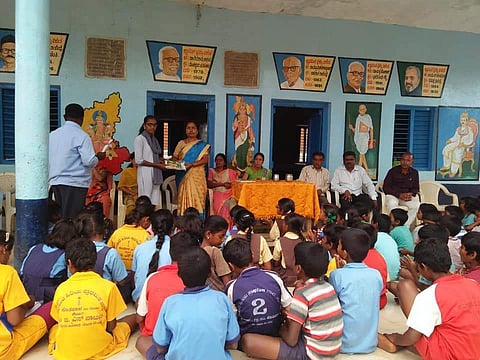

When Raju heard his cousins communicate in English fluently, he also wanted to learn the language. Unfortunately, he lives in rural Karnataka and accessing English training is a bit difficult. That's where Deshpande Foundation's Skill in Village
The programme details
Initially, Guru and his team launched this pilot project in a few schools and the programme went well. The response from both parents and children was overwhelming. He says, "Whenever we launch this programme in a particular school, we make sure to involve the School Development and Monitoring Committee, headmaster of the school, Gram Panchayat members and the parents. We tell them what exactly the programme is about and then teach their kids. We start the English classes two hours before the actual school timings. These classes are meant for class 6 to 10 students. Our team looks into the lessons and the content that is taught. All this happens through various games and activities that make it fun to learn the language. We also follow the Listening-Speaking-Reading-
The Skill in Village team also ensures that the teachers who are hired are well-qualified and patient. Usually, they look for basic graduation or even post-graduation, a BEd qualification is an added advantage. The candidates go through various rounds of interviews. Once they are appointed, they go through a week-long training programme and finally, they're allocated to particular government schools. There are two types of teachers in this programme, while one category is a full-time teacher, another category includes a resource person who works for four hours a day — two hours in the morning and two hours in the evening. Most of these teachers belong to that particular village where they are appointed to teach.
The pandemic changed it all
When the state went into lockdown, the Skill in Village programme also went online like every other programme. Guru explains, "We tapped the data on the number of students who have access to their parents' smartphones and shared assignments and videos with the students so that they can learn. We trained our teachers also to use Zoom and other video conferencing platforms. Then, we started conducting online classes for children. For those kids who don't have smartphones, we asked them to join their friends at their house to attend these classes. For some time, our teachers also participated in the Vidyagama programme. This allowed the teachers to meet students personally and analyse if they have understood the lessons or not."
Updating the modules and content for their English programme is another unique factor of the Skill in Village programme. "Our team meets up every year to update the content and discuss what can be taught that's new. Currently, our programme has reached out to 70 schools across two states including Karnataka and Telangana, impacting over 5,000 students. In the days to come, we would like to work directly with the government and involve the government school teachers in the programme rather than hire a separate teacher from our side. This is our long-term plan and it will take some time to be implemented."
